
Key Takeaways
- The best CRM for manufacturing streamlines processes, enhances customer relations, and ensures efficiency in intricate workflows.
- In 2023, businesses are seeking CRMs tailored to address unique manufacturing challenges and foster lasting customer relationships.
- Top manufacturing CRMs go beyond customer tracking, aiding in seamless operations, intelligent decision-making, and stronger customer relationships.
- Key features for manufacturing CRMs include integration capabilities, customization features, and scalability for optimal business growth.
- Reviewed CRMs like Salesmate, HubSpot CRM, Zoho CRM, Engagebay, Pipedrive, Keap CRM, and ClickUp offer diverse solutions for manufacturing needs.
- CRM benefits for manufacturing encompass efficient customer management, streamlined sales processes, & data-driven decision-making.
When making things in companies, choosing the best CRM for manufacturing in 2024 is like picking the most accessible tool to complete the job.
This year, more and more businesses are looking for CRMs specifically designed to tackle their unique challenges.
These special CRMs go beyond just keeping track of customers – they help factories run smoothly, make smarter decisions, and build better customer relationships.
This overview closely examines some of the top CRM options, each trying to be known as the best CRM for manufacturing.
These tools are all about being precise, adaptable, and efficient, which is essential in manufacturing.
- CRM for manufacturing
- What makes the best manufacturing CRM?
- 7 best CRM for manufacturing
- 1. Salesmate – Precision in manufacturing processes
- 2. HubSpot CRM – Holistic manufacturing efficiency
- 3. Zoho CRM – Affordable manufacturing solution
- 4. EngageBay – Unified platform for manufacturing growth
- 5. Pipedrive – Streamlining sales for manufacturing success
- 6. Keap CRM – Automation hub for manufacturing efficiency
- 7. ClickUp – Powerhouse for manufacturing collaboration
- 8. Leadsquared: The missing piece in your manufacturing sales
- 9. Softr – Flexibility and Customization for Manufacturing Workflows
- 1. Salesmate – Precision in manufacturing processes
- Why should you use a CRM for manufacturing?
CRM for manufacturing

CRM for manufacturing refers to a specialized system that enables manufacturing companies to manage and optimize customer interactions efficiently throughout the entire business lifecycle.
This tailored CRM solution is designed to address the unique challenges of the manufacturing industry, offering a centralized platform for organizing customer data, streamlining communication, and enhancing overall operational efficiency.
The primary objectives of CRM in manufacturing include improving customer satisfaction, facilitating seamless order processing, and leveraging data-driven insights for informed decision-making.
By providing a comprehensive view of customer interactions and integrating with other essential business processes.
CRM for manufacturing empowers companies to build stronger client relationships, boost sales, and adapt more effectively to dynamic market demands.
Some of the top CRM in the market for manufacturing empower companies to build stronger client relationships, boost sales, and adapt more effectively to dynamic market demands.
What makes the best manufacturing CRM?

In the dynamic manufacturing landscape, selecting the most effective CRM system involves considering key features tailored to the industry’s unique needs.
A robust manufacturing CRM should encompass the following aspects, making it the optimal choice for businesses in this sector:
1. Integration capabilities
Seamless integration with existing systems, including ERP and inventory management, is fundamental for top-tier manufacturing CRM software.
This ensures a unified workflow and prevents data silos, fostering optimal efficiency.
2. Customization features
The adaptability to customize the CRM according to the specific needs of manufacturing processes is crucial.
This tailored approach ensures that the CRM for manufacturing aligns precisely with industry requirements, making it the best CRM for manufacturing companies.
3. Scalability for business growth
The best CRM for manufacturing businesses is scalable, accommodating growing data volumes, user expansion, and evolving functionalities without compromising performance.
This scalability is vital for long-term relevance and effectiveness.
By incorporating these aspects, a comprehensive CRM in manufacturing can elevate productivity, streamline operations, and provide a tailored solution that meets the distinctive demands of the industry, establishing itself as the best CRM for manufacturing.
7 best CRM for manufacturing
Selecting the optimal CRM for the manufacturing sector involves carefully evaluating features, pros, cons, pricing, and user ratings.
Here’s an in-depth analysis of the top 7 CRMs:
1. Salesmate – Precision in manufacturing processes
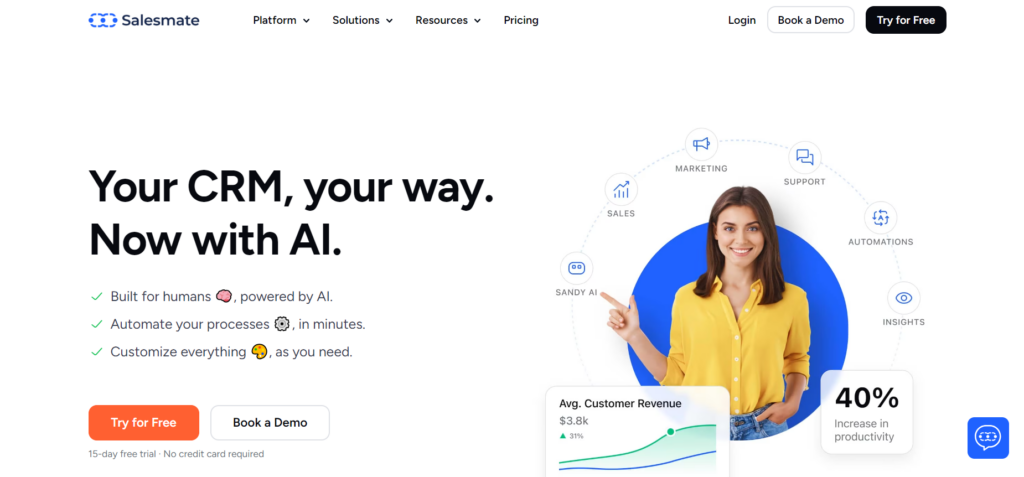
Salesmate stands out as a CRM designed to bring precision to manufacturing processes.
With an intuitive interface, it facilitates seamless navigation for users involved in intricate manufacturing workflows.
Its robust automation features are tailored to enhance sales processes, ensuring efficiency and minimizing manual effort.
Recognized for integration capabilities, Salesmate is particularly well-suited for manufacturing professionals who seek a cohesive platform that collaborates seamlessly with existing systems.
The customizable dashboards and mobile accessibility make it a comprehensive solution for manufacturers aiming for optimal customer relationship management.
Pros
1. Intuitive interface- Salesmate, a standout manufacturing CRM software, boasts an intuitive interface, ensuring a seamless user experience navigating manufacturing intricacies.
2. Automation efficiency- The robust automation features significantly enhance sales processes, a crucial aspect for manufacturing companies seeking efficiency.
3. Integration prowess– Recognized as a top-tier CRM for manufacturing industry, Salesmate excels in seamless integration, fostering collaboration and data synergy.
4. Customizable dashboards– Users benefit from customizable dashboards, allowing a focus on key metrics pertinent to manufacturing operations.
5. Mobile accessibility– With mobile accessibility, Salesmate ensures that manufacturing professionals stay connected and manage tasks on the move.
Cons
1. Learning curve for advanced features- Some advanced features may pose a learning curve, particularly for those new to sophisticated CRM functionalities.
2. Limited third-party integrations- While integration capabilities are robust, some users may need more than third-party integration options.
Key Features
- Sales automation & pipeline
- Built-in calling & texting
- Power dialer
- Marketing automation
- Live chat
Pricing
- Starter plan: $12/User per month
- Growth plan: $24/User per month
- Boost plan: $40/User per month
- Enterprise plan: Custom pricing
G2 Rating
2. HubSpot CRM – Holistic manufacturing efficiency
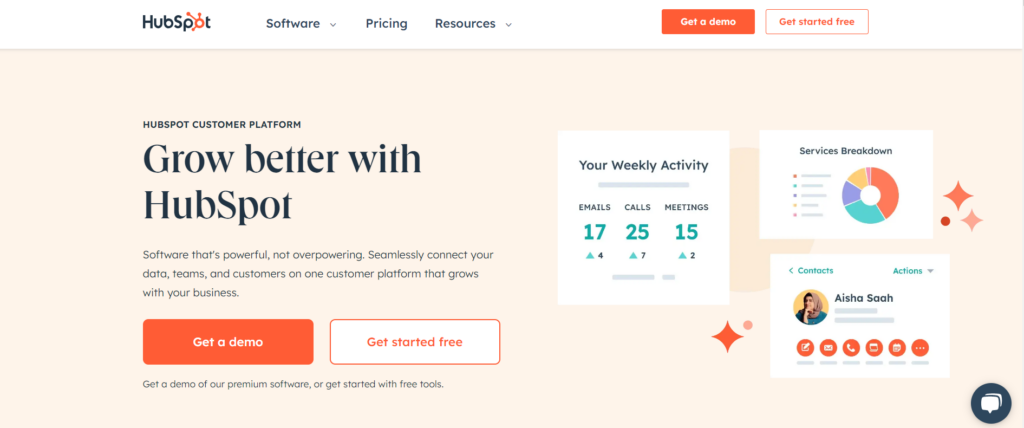
HubSpot CRM is a holistic solution designed for manufacturing efficiency.
Its user-friendly interface ensures accessibility for users across varying technical proficiencies in the manufacturing sector.
As an all-in-one platform, it seamlessly integrates with marketing and service features, providing manufacturing companies with a comprehensive toolset.
The customization options cater to specific manufacturing needs, while robust marketing and sales automation features enhance operational efficiency.
HubSpot CRM is a go-to solution for manufacturers seeking a unified and streamlined approach to customer relationship management.
Pros
1. User-friendly interface- HubSpot CRM, often hailed as the best CRM for manufacturing is known for its user-friendly interface, ensuring accessibility for users across all technical proficiencies.
2. Seamless integration- With marketing and service features, HubSpot CRM presents a comprehensive platform for manufacturing companies seeking an all-in-one solution.
3. Customization options-While not exhaustive, HubSpot CRM offers customization options, allowing businesses to tailor the CRM to their specific manufacturing needs.
4. Marketing automation- Recognized for robust marketing automation features, HubSpot CRM significantly enhances overall marketing efficiency for manufacturing enterprises.
5. Task automation- Automation extends beyond sales, automating routine tasks and freeing up time for more strategic activities.
Cons
1. Advanced features in paid plans- Certain advanced features are reserved for users subscribed to paid plans, potentially limiting access for businesses with budget constraints.
2. Limited customization- For businesses with highly specific customization needs, HubSpot’s customization options may be perceived as somewhat limited.
Key features
- Marketing automation & email marketing
- Sales automation
- Lead tracking
- Customer service tools
Pricing
- Professional – $450/mo
- Enterprise – $1200/mo
G2 Rating
3. Zoho CRM – Affordable manufacturing solution
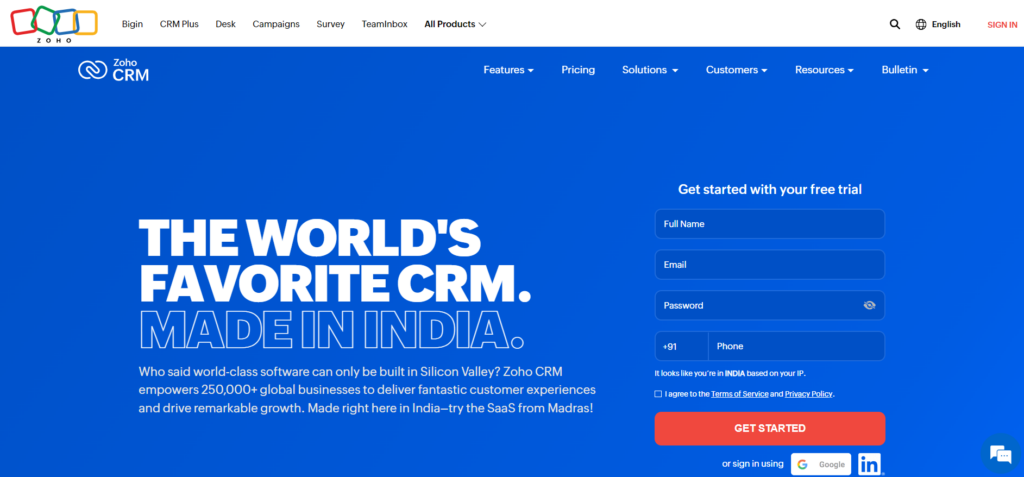
Zoho CRM emerges as an affordable yet comprehensive suite tailored for manufacturing.
Its budget-friendly pricing, including a free plan, makes it an attractive option for small to medium-sized manufacturing businesses.
With a suite covering sales, marketing, and customer support modules, Zoho CRM is positioned as an exemplary software for manufacturing professionals.
Robust workflow automation capabilities streamline various manufacturing processes, while analytics tools provide valuable insights.
Zoho CRM’s multichannel communication further enhances customer engagement, making it a versatile and cost-effective choice for manufacturing companies.
Pros
1. Affordable pricing- Zoho CRM stands out for its affordable pricing structure, including a free plan, catering to the budget considerations of manufacturing businesses.
2. Comprehensive suite- Positioned as an exemplary CRM software for manufacturing, Zoho CRM provides a comprehensive suite encompassing sales, marketing, and customer support modules.
3. Workflow automation- Zoho CRM offers robust workflow automation capabilities, streamlining various manufacturing business processes.
4. Analytics- With analytics tools, Zoho CRM empowers manufacturing professionals with insights into sales performance and customer behavior.
5. Multichannel communication- Zoho CRM facilitates multichannel communication, enhancing customer engagement strategies for manufacturing companies.
Cons
1. Steeper learning curve- Some users may experience a steeper learning curve, particularly when exploring advanced features of Zoho CRM.
2. Limited customization in free plan-Customization options are somewhat limited in the free plan, catering to basic needs.
Key features
- Workflow Automation
- Analytics
- Multichannel Communication
Pricing
Free plan available; paid plans start at $14/user/month.
G2 Rating
4.2/5
4. EngageBay – Unified platform for manufacturing growth
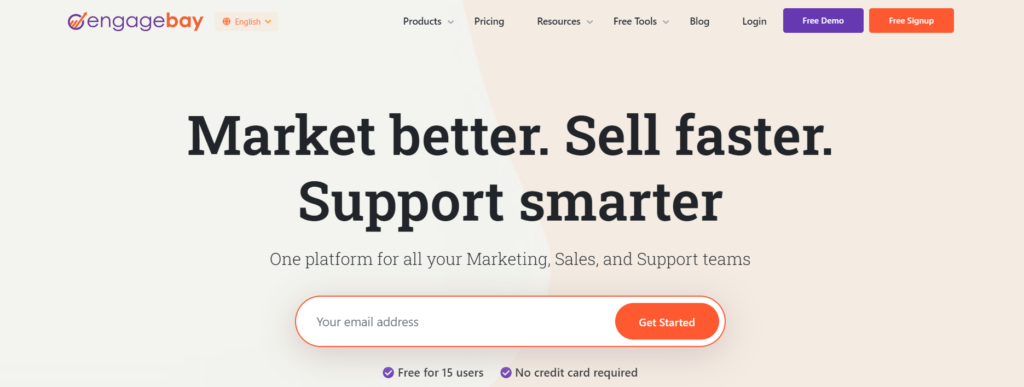
EngageBay is an all-in-one platform that fosters growth in manufacturing.
Tailored for marketing, sales, and service, it provides manufacturing companies with a cohesive environment.
Its affordability, especially for small to medium-sized businesses, positions it as an excellent CRM for manufacturing companies.
The unified user interface ensures a seamless experience across different functionalities, promoting efficiency.
Customizable workflows adapt to specific manufacturing processes, and robust email marketing features enhance communication strategies.
EngageBay is a valuable ally for manufacturing enterprises aiming for growth through comprehensive CRM capabilities.
Pros
1. All-in-one platform- EngageBay stands out as an all-in-one platform, offering marketing, sales, and service tools, providing a cohesive environment for manufacturing enterprises.
2. Affordable pricing- Positioned as an affordable CRM for manufacturing companies, EngageBay caters to the needs of small to medium-sized businesses with budget-friendly plans.
3. Unified user interface- The unified user interface ensures a seamless experience across different functionalities, promoting efficiency in manufacturing operations.
4. Customizable workflows- EngageBay allows users to create customizable workflows, aligning with specific business processes and adapting to manufacturing nuances.
5. Email marketing capabilities- The CRM includes robust email marketing features, enhancing communication strategies for manufacturing professionals.
Cons
1. Limited third-party integrations- Some users may find the options for third-party integrations to be somewhat limited, potentially impacting overall system compatibility.
2. Advanced features in higher-tier plans- Certain advanced features are available in higher-tier plans, which might be a consideration for businesses with specific needs.
Key features
- Email marketing & automation
- Contact management
- Customer support
Pricing
- Plans start at $8.99 per user per month
- Additional features available at higher pricing tiers
G2 Rating
5. Pipedrive – Streamlining sales for manufacturing success
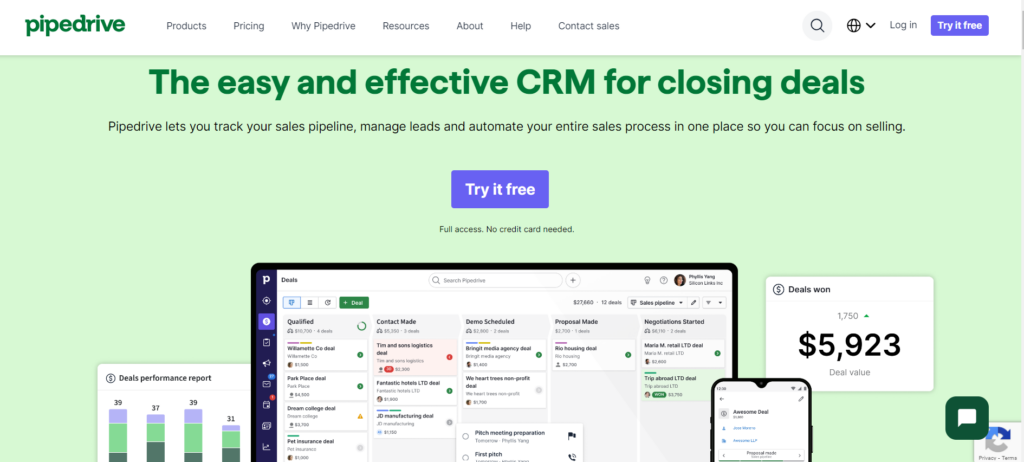
Pipedrive excels in streamlining sales processes, making it an ideal CRM for manufacturing businesses.
With a user-friendly interface and straightforward navigation, Pipedrive ensures a seamless experience for manufacturing professionals.
Automation capabilities contribute to operational efficiency, and robust reporting features allow users to track and analyze sales performance.
While focusing on pipeline management, Pipedrive also offers integration options with popular third-party tools, enhancing its functionality.
Pipedrive is a valuable asset for manufacturing companies seeking a CRM that prioritizes sales effectiveness.
Pros
1. Sales pipeline management- Pipedrive excels in sales pipeline management, offering a visual and customizable representation of the sales process for manufacturing companies.
2. User-friendly interface- With a user-friendly interface and straightforward navigation, Pipedrive ensures a seamless experience for manufacturing professionals.
3. Automation capabilities- The CRM provides automation capabilities for repetitive tasks, contributing to improved operational efficiency in manufacturing workflows.
4. Reporting features- Pipedrive includes robust reporting features, allowing users to track and analyze sales performance, a critical aspect in manufacturing operations.
5. Integration Options- While not exhaustive, Pipedrive offers integration options with popular third-party tools, enhancing overall system functionality.
Cons
1. Limited built-in marketing features- Users seeking comprehensive built-in marketing features may find Pipedrive somewhat lacking in this aspect.
2. Simplistic interface-Some users may perceive the interface as overly simplistic, potentially impacting user experience preferences.
Key Features
- Pipeline management & customization
- Automation
- Sales reporting & analytics
Pricing
- Essential plan – $9.90 per user per month
- Advanced plan – $19.90 per user per month
- Professional plan – $39.90 per user per month
- Power plan – $49.90 per user per month
- Enterprise plan – $59.90 per user per month
G2 Rating
6. Keap CRM – Automation hub for manufacturing efficiency
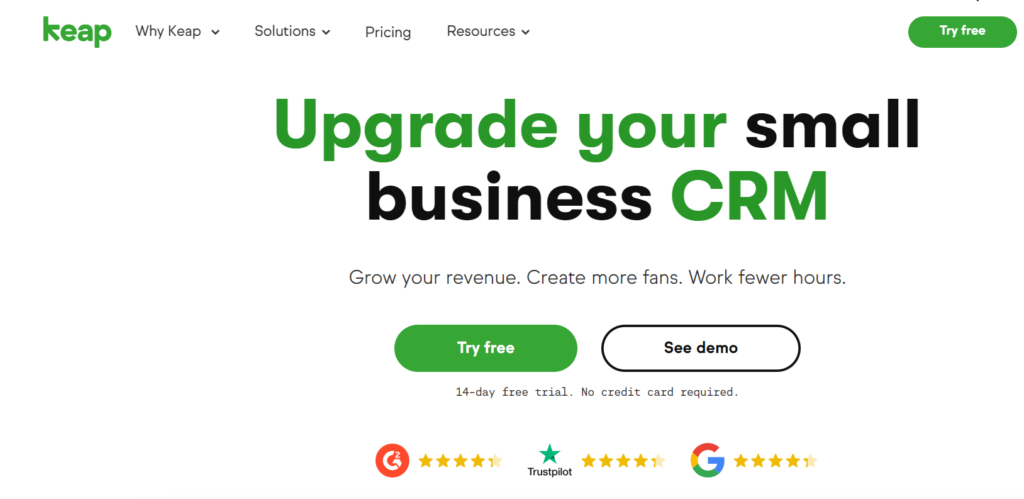
Keap CRM positions itself as an automation hub for manufacturing efficiency.
With robust automation capabilities, it streamlines various sales and marketing processes, making it suitable for manufacturing professionals seeking efficiency gains.
Serving as an all-in-one platform for sales and marketing, Keap reduces the need for multiple tools, simplifying operations.
Its prowess in contact management ensures a centralized database for crucial customer information in manufacturing relationships.
Keap facilitates personalized and automated communication, making it an impactful CRM for manufacturing enterprises aiming for streamlined customer relationship management.
Pros
1. Robust automation- Keap CRM features robust automation capabilities, streamlining various sales and marketing processes for manufacturing businesses.
2. All-in-one platform- Serving as an all-in-one platform for sales and marketing, Keap reduces the need for multiple tools, simplifying operations for manufacturing professionals.
3. Contact management- The CRM excels in contact management, providing a centralized database for customer information critical in manufacturing relationships.
4. Customer communication- Keap facilitates personalized and automated communication with customers, enhancing customer relationships for manufacturing enterprises.
5. E-Commerce integration- For businesses with e-commerce operations, Keap offers seamless integration, providing a holistic view of customer interactions for manufacturing professionals.
Cons
1. Interface overwhelming for new users- Some users, especially those new to CRM systems, may find the interface overwhelming initially, potentially impacting the onboarding experience.
2. Advanced features in higher-tier plans- Certain advanced features are available in higher-tier plans, which might be a consideration for businesses with specific needs.
Key features
- Contact management
- Sales & marketing automation
- Customer support
Pricing
- Pro: $159 per month
- Max: $229 per month
G2 Rating
7. ClickUp – Powerhouse for manufacturing collaboration
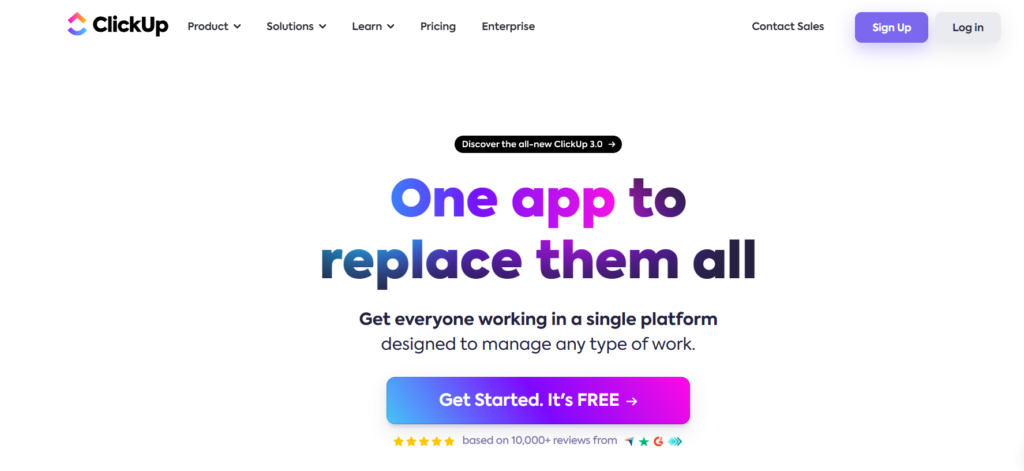
ClickUp is a project management powerhouse ideal for manufacturing collaboration.
With comprehensive project management features, it caters to manufacturing businesses with diverse teams and projects.
The customizable workspace aligns with unique manufacturing workflows, ensuring adaptability.
ClickUp’s integration capabilities enhance functionality and ensure compatibility with existing manufacturing systems.
Despite its comprehensive features, ClickUp maintains a user-friendly interface, promoting ease of use for manufacturing professionals.
With collaboration tools fostering teamwork, ClickUp is a versatile solution for manufacturing companies aiming for effective project management alongside CRM functionalities.
Pros
1. Comprehensive project management- ClickUp offers comprehensive project management features, making it suitable for manufacturing businesses with diverse teams and projects.
2. Customizable workspace- Users can create a customizable workspace, aligning with their unique manufacturing workflow and collaboration needs.
3. Integration capabilities- ClickUp integrates with various third-party tools, enhancing its functionality and ensuring compatibility with existing manufacturing systems.
4. User-friendly interface- Despite its comprehensive features, ClickUp maintains a user-friendly interface, promoting ease of use for manufacturing professionals.
5. Collaboration tools– ClickUp provides collaboration tools, fostering teamwork and communication crucial in manufacturing environments.
Cons
1. Learning curve for project management novices- Users unfamiliar with project management tools may experience a learning curve initially, impacting the initial implementation phase.
2. CRM-focused users- For those primarily seeking CRM functionalities, some features in ClickUp may be perceived as more than necessary.
Key Features
- Project management & automation
- Collaboration tools
- Integrations with other applications
Pricing
Free Plan: $0
Unlimited Plan: $7/user per month
Business Plan: $12/user per month
Enterprise Plan: Contact sales teams
G2 Rating
Choosing the right CRM from these options requires a meticulous consideration of manufacturing requirements, ensuring that the selected platform aligns seamlessly with the unique needs of the industry.
8. Leadsquared: The missing piece in your manufacturing sales
Leadsquared equips your sales reps with real-time data and automated workflows to handle repetitive tasks like lead scoring, quote generation, and follow-up emails. This frees them up to focus on high-value activities like building relationships and closing deals.
Leadsquared also goes beyond basic contact management by offering in-depth lead tracking.
You can identify bottlenecks in your sales funnel, understand customer behavior, and optimize your conversion process for maximum efficiency.
Additionally, powerful analytics provide data-driven insights into sales performance, allowing you to make informed decisions and improve overall sales effectiveness.
Pros
- Automated workflows (lead nurturing, quotes, follow-ups)
- Detailed lead tracking & conversion optimization
- Data-driven insights for informed sales decisions
- Streamlined communication with prospects and customers
Cons
- Customization might be needed for complex sales processes
- Initial learning curve for the sales team
Features
- Sales pipeline management
- Lead scoring and nurturing
- Automated email marketing
- Quote generation
- Reporting and analytics
Pricing
Available upon request
G2 Rating
9. Softr – Flexibility and Customization for Manufacturing Workflows
Softr stands out as a powerful no-code CRM tool tailored for manufacturers seeking high customization and integration with their existing data sources. Whether you’re managing customer relationships, tracking orders, or handling complex workflows, Softr helps manufacturers build a CRM that adapts to their specific needs. It integrates seamlessly with data from Airtable, Google Sheets, and other tools, allowing you to manage lead tracking, customer interactions, and sales pipelines—all within one platform.
Pros
- No-code platform – Build and customize your CRM without needing technical expertise.
- Seamless integrations – Connect with popular tools like Airtable, Google Sheets, and more to streamline workflows.
- Granular permissions – Tailor user access for different teams, ensuring only relevant information is visible.
- Custom CRM modules – Adapt the CRM to fit your specific manufacturing processes, from lead management to order tracking.
Cons
- Learning curve for customization – Setting up advanced custom workflows may take some time for new users.
- Limited templates for specific manufacturing needs – Most templates are more generalized, so heavy customization might be necessary.
Key Features
- Custom sales pipelines
- Advanced user permissions
- Real-time reporting and analytics
- Seamless integration with data sources like Airtable and Google Sheets
Pricing
- Free plan available
- Basic: $49/month
- Professional: $139/month
- Business: $269/month
G2 Rating
4.8/5
Why should you use a CRM for manufacturing?

1. Efficient customer management
CRM systems for manufacturing excel in efficient customer management by providing a centralized repository for customer data.
This comprehensive view allows manufacturers to understand customer needs, preferences, and interactions, facilitating personalized communication.
With organized customer information, manufacturers can address inquiries promptly, anticipate customer requirements, and build lasting relationships, contributing to customer loyalty and satisfaction.
2. Streamlined sales processes
A CRM system streamlines manufacturing sales processes through automation and effective lead management.
It automates routine tasks, reducing manual effort and minimizing errors.
Looking for CRM’s which focus on managing leads and optimizing the sales pipeline ensures that manufacturing sales teams can prioritize and engage with leads effectively.
This streamlined approach results in shorter sales cycles, quicker decision-making, and improved overall sales performance for manufacturing businesses.
3. Data-driven decision-making
Implementing a CRM in manufacturing empowers businesses to make data-driven decisions.
The system collects and analyzes customer data, providing valuable insights into purchasing behavior, market trends, and product performance.
With this information, manufacturers can make informed decisions regarding product development, marketing strategies, and resource allocation, contributing to the overall success and competitiveness of the business.
4. Improved order processing
CRM software for manufacturing significantly enhances order processing efficiency.
By centralizing order information, the CRM ensures that sales, production, and fulfillment teams have real-time access to order details.
This streamlines communication and coordination, reducing the likelihood of errors and delays in order fulfillment.
Manufacturers can track order status, manage inventory effectively, and deliver products to customers on time, thereby enhancing overall customer satisfaction.
5. Enhanced communication and collaboration
Manufacturing CRMs play a pivotal role in enhancing communication and collaboration across teams.
The platform facilitates real-time information sharing between sales, marketing, and production teams.
This collaborative environment ensures that everyone is aligned with customer needs, production schedules, and market changes.
Improved communication leads to faster response times, better coordination, and a more agile manufacturing process that can adapt swiftly to evolving business requirements.
6. Adaptability to dynamic market demands
The adaptability provided by CRM systems is crucial for manufacturing businesses facing dynamic market demands.
Manufacturers can quickly adjust their strategies and production processes by staying informed about customer preferences and market trends.
Whether introducing new products, modifying existing ones, or adjusting production volumes, the insights gained from the CRM enable manufacturers to respond promptly to market changes, maintaining competitiveness and relevance.
7. Increased customer satisfaction
CRM systems contribute directly to increased customer satisfaction in manufacturing.
Through personalized interactions enabled by detailed customer profiles, manufacturers can provide tailored solutions, address concerns promptly, and exceed customer expectations.
Efficient order processing, accurate information sharing, and proactive communication enhance customer experience.
Satisfied customers are more likely to become repeat customers, fostering loyalty and positive word-of-mouth, which is invaluable in the competitive manufacturing landscape.
Conclusion
To wrap it up, 2024 is an essential time for manufacturing.
Using the best CRM for manufacturing isn’t just about having another tool – it’s like having a helpful partner.
These CRMs have features that make it easier to handle customers, sell things, and make decisions based on information.
Whether a factory chooses Salesmate, HubSpot CRM, Zoho CRM, EngageBay, Pipedrive, Keap CRM, or ClickUp, each brings something unique.
By using these tools, factories can stay ahead of the game, tackle challenges, and maximize opportunities in the ever-changing manufacturing world.
